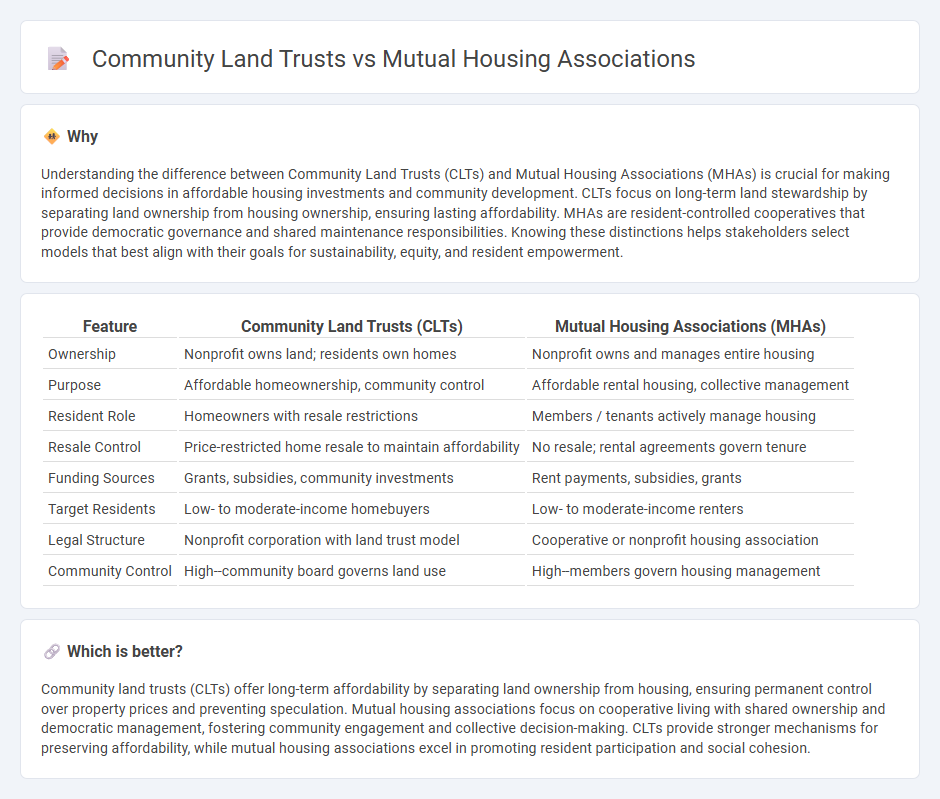
Community land trusts offer residents collective ownership of land to ensure long-term housing affordability and prevent displacement, while mutual housing associations provide cooperative ownership with shared responsibilities for managing residential communities. Both models prioritize community control and sustainable housing solutions that protect residents from market fluctuations. Explore how these innovative frameworks can transform local real estate landscapes and promote equitable homeownership.
Why it is important
Understanding the difference between Community Land Trusts (CLTs) and Mutual Housing Associations (MHAs) is crucial for making informed decisions in affordable housing investments and community development. CLTs focus on long-term land stewardship by separating land ownership from housing ownership, ensuring lasting affordability. MHAs are resident-controlled cooperatives that provide democratic governance and shared maintenance responsibilities. Knowing these distinctions helps stakeholders select models that best align with their goals for sustainability, equity, and resident empowerment.
Comparison Table
| Feature | Community Land Trusts (CLTs) | Mutual Housing Associations (MHAs) |
|---|---|---|
| Ownership | Nonprofit owns land; residents own homes | Nonprofit owns and manages entire housing |
| Purpose | Affordable homeownership, community control | Affordable rental housing, collective management |
| Resident Role | Homeowners with resale restrictions | Members / tenants actively manage housing |
| Resale Control | Price-restricted home resale to maintain affordability | No resale; rental agreements govern tenure |
| Funding Sources | Grants, subsidies, community investments | Rent payments, subsidies, grants |
| Target Residents | Low- to moderate-income homebuyers | Low- to moderate-income renters |
| Legal Structure | Nonprofit corporation with land trust model | Cooperative or nonprofit housing association |
| Community Control | High--community board governs land use | High--members govern housing management |
Which is better?
Community land trusts (CLTs) offer long-term affordability by separating land ownership from housing, ensuring permanent control over property prices and preventing speculation. Mutual housing associations focus on cooperative living with shared ownership and democratic management, fostering community engagement and collective decision-making. CLTs provide stronger mechanisms for preserving affordability, while mutual housing associations excel in promoting resident participation and social cohesion.
Connection
Community land trusts and mutual housing associations both promote affordable housing by separating land ownership from building ownership, ensuring long-term community control and stability. These models reinvest profits into maintaining and expanding housing stock, prioritizing residents' needs over market speculation. Their shared focus on collective ownership structures fosters sustainable, inclusive neighborhoods and protects against displacement.
Key Terms
Collective Ownership
Mutual housing associations and community land trusts both emphasize collective ownership, where residents have a stake in decision-making and property management. Mutual housing associations primarily focus on providing affordable rentals with control retained by tenants, while community land trusts secure land ownership to ensure long-term affordability and community stewardship. Explore how these models foster sustainable housing solutions by learning more about their unique frameworks and benefits.
Land Tenure
Mutual housing associations grant residents collective ownership and management rights, ensuring long-term affordable housing through leasehold arrangements. Community land trusts retain ownership of the land while allowing residents to own or lease the homes, separating land tenure from building ownership to maintain affordability. Discover the key differences in land tenure structures that make each model unique and effective in sustainable housing solutions.
Resident Control
Mutual housing associations grant residents collective ownership and decision-making powers, fostering democratic control over housing management and maintenance. Community land trusts separate land ownership from housing ownership, enabling residents to govern the land use while ensuring long-term affordability and community control. Explore how these models empower residents to shape sustainable, equitable housing solutions tailored to their needs.
Source and External Links
Mutual Housing Associations - Mutual Housing Associations are nonprofit corporations that construct, own, and operate affordable housing, incorporating community and resident involvement in management.
Mutual Housing California - Mutual Housing California develops, operates, and advocates for sustainable housing with resident participation and leadership in California.
Mutual Housing Associations as a Solution to Gentrification - Mutual Housing Associations can help slow gentrification by providing a form of community-controlled housing with restrictions on ownership.
 dowidth.com
dowidth.com